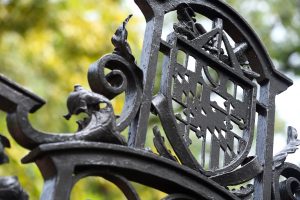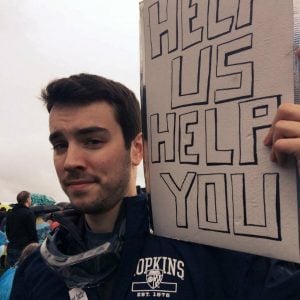

Elliot Wainwright, PhD Candidate
Elyria, OH
Elliot Wainwright is a 3rd Year PhD Candidate from Elyria, OH (near Cleveland). He is a member of Professor Timothy Weihs’ Research Group. His photo was taken at the March for Science in Washington DC, April 2017.
How did you get interested in materials science and engineering? What interests you the most about the field?
When I was an undergraduate at The College of Wooster in Wooster, OH, I had a fantastic senior thesis advisor there (called Independent Study or “IS” for short) named Dr. Susan Lehman who had spent the majority of her career in experimental condensed matter physics. Her classes on condensed matter, combined with my research there in granular mechanics and critical phenomena, sparked an interest to learn more about applied research.
I saw materials science as a breakout field which was the perfect balance of having the application of the research within grasp, while still being able to conduct important pure-science research. I love how collaborative and multidisciplinary the field is; you have to know a bit of chemistry, mechanical engineering, physics, and thermodynamics, all tied and focused in on materials properties and controlling them. The fact that I’m able to contribute to all scales of material development, from synthesis to characterization to implementation into a larger product or application, really brings a sense of accomplishment.
Gosh, I’ve met so many people of different scientific backgrounds and who do such different kinds of research in my short time in the field. If variety is the spice of life, then materials science is the ghost pepper of the scientific world.
What made you decide to come to Johns Hopkins?
Believe it or not, Hopkins was the only school that I visited before I was accepted into the school, and in that sense, it was unique. Besides the obvious prestige of Hopkins, the people are what really made an impact on me when I visited. I mean, talk about personable and welcoming! I loved that I knew what advisor I would have – to be able to have already met that person was key. Knowing what project I was going to be working on (at least to start my graduate career) was, for me, immeasurably comforting.
I knew that I wanted to be involved in research with defense funding, so the combination of an available project, with that condition, and my advisor and I getting along well made for a powerful combination.
Are you involved in any research? If so, what’s your role?
I basically do research that is any 12 year old’s dream job: I set metals on fire and watch them with a high-speed camera and other diagnostics to try to understand how they burn.
In more specific terms, I’m working on a research project for the Defense Threat Reduction Agency (DTRA) where we are developing metal fuels which would be added to an explosive formulation and implemented in biological weapon facilities to decontaminate spores like anthrax that are either aerosolized or in storage containers.
My job has been to make the composite powders, characterize their microstructural, ignition, and combustion properties, and ultimately develop a mechanistic understanding of how all of those things intertwine. In addition, we’ve had some neat collaborations with the Naval Surface Warfare Center at Indian Head (NSWC-IH), the Army Research Laboratory (ARL), and various other academic institutions where we get to see how our composite fuel powders compare to benchmarks such as a pure aluminum in a variety of pyrotechnic, explosive, and bio-agent defeat applications.
What impact do you hope to make through your research?
Ultimately, I hope that my research helps to make the world (read as: the US and our allies) a safer place. The golden egg would be to see that the research ultimately performs well in the military’s testing, and is chosen as the fuel of choice for these sorts of counter biological agent munitions. If my research could save even one life, it would all be so worth it.
More realistically, I’m hoping that my work will develop some understanding on an interesting system within the metal combustion field, and will carry the proverbial torch just one step forward as the next generation (that is, my generation) of niche combustion scientists emerges.
Outside of lab and class: what are you involved with (groups, organizations, intramurals, etc.)?
Luckily, I have time to be involved in a few things. The biggest is that I’m one of two Social Chairs for the Graduate Representation Organization (GRO), which means that I plan events for the entire graduate student population at the Homewood campus such as our weekly coffee hours and bi-weekly happy hours. It’s a nice outlet to meet a lot of new people and make a lot of my colleagues happy on a regular basis. The organization itself serves as an advocacy group to the administration about important issues affecting graduate students, such as healthcare, academic and social policy, and diversity initiatives.
I’m also the co-captain of the Material Science department’s intramural summer softball league. Recently, I’ve also been sitting on a departmental committee which organizes and is trying to improve our graduate student seminar series.
What sort of impact do you hope to have either as an engineer or in a STEM field?
I think a lot of young scientists have dreams and aspirations of becoming famous, Nobel prize-winning scientists. That would be nice, but I think it’s good to realize that takes a significant amount of luck and being in the right research field at the right time. I tend to take a bit of a more realistic approach, which is this: I just want to be as productive and helpful as possible to whatever field I end up in. I love the combustion/reactive/energetic materials fields and would love to stay in them. Ideally, I’ll end up at a national lab, or agency like NASA, with mission-based research which has clear goals. If I could contribute to something larger than myself in some small way- developing important patents at a national lab, helping develop spacecraft components that get us closer to putting humans on Mars, etc.- I would be happy.
I’d love to get more into advocating for science, not only within the community but beyond. Whether it be through outreach and training the next generation of scientists, advocacy to politicians and policymakers in Washington, or inspiring the general public’s awe and support of America’s scientific enterprise like we had in the space race. In this day and age when scientific funding is under constant threat and basic facts have apparently lost all meaning, a scientist’s job can no longer be contained to just the lab.
What are your plans or goals for the rest of your time in the program at JHU?
I’m in my 3rd year of my PhD and am expecting to spend ~2 more years here. I’ve passed my thesis proposal so, at this point, it’s a matter of putting in the effort to publish the work I’ve already completed and move to finish the rest of what will constitute my thesis. This coming summer, I’ll be spending three months at Lawrence Livermore National Laboratory (Livermore, CA) where I’ll be working with a research group in 3D printing thermite mixtures. I’m quite excited about that. Beyond the internship, there are a few important conferences coming up including the Energetic Materials Gordon Research Conference (GRC) in June that I’ll attend. Hopefully, I’ll be able to present some work on a new combustion diagnostic tool I’ve been developing in collaboration with Mark Foster’s group in Electrical & Computer Engineering.